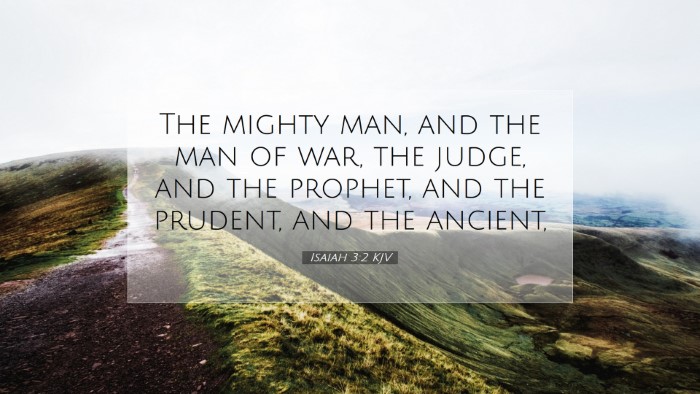Commentary on Isaiah 3:2
Isaiah 3:2 is a powerful verse that speaks to the socio-political and spiritual climate of Jerusalem during the time of Isaiah. It reads: "And I will give children to be their princes, and babes shall rule over them." This verse is deeply significant and invites reflection on leadership, governance, and the consequences of moral and spiritual decay.
Contextual Overview
To fully grasp the weight of Isaiah 3:2, it is essential to consider the broader context of the Book of Isaiah. Written during a time of impending judgment upon Judah and Jerusalem, Isaiah’s prophecies serve as both warnings and proclamations of hope.
Social and Political Context
Isaiah's prophecy occurred during a tumultuous period in the history of Israel. Political instability, moral corruption, and a departure from covenant faithfulness characterized society. The leadership was failing its duties, and as a result, God promised to strip them of their wise leaders, replacing them with those devoid of experience—children and babes—symbolizing both immaturity and lack of capability.
- Matthew Henry: Henry elucidates that this prophecy serves as a judgment from God, showing the consequences of turning away from divine wisdom. He notes that when spiritual leaders abandon their responsibilities, the nation suffers, and inexperienced leadership emerges.
- Albert Barnes: Barnes suggests that this period of woeful governance represents a complete reversal of what is typically expected. He comments on the implications of having rulers who lack wisdom, insight, and the ability to lead effectively.
- Adam Clarke: Clarke reflects on the symbolism inherent in the metaphor of children ruling. He notes that the absence of mature, wise leadership indicates a profound lack of societal order and governance.
Theological Implications
Isaiah 3:2 raises important theological questions regarding the nature of God’s judgment and the characteristics of true leadership. The text suggests that divine judgment can lead to a reversal of fortunes, where the wise are replaced by the foolish.
Divine Sovereignty
This verse underlines God’s sovereignty over nations and rulers. As Henry and Barnes both point out, it illustrates the reality that God can remove leaders and allow societal chaos as a form of punishment for rebellion against his commands.
Example of Judgment in History
Throughout Scripture, examples abound where God’s people faced consequences for their disobedience. The rise of inexperienced leadership often serves as a glaring indicator of divine displeasure, marking a turn from prosperity to turmoil.
Leadership and Discipleship
This passage serves as a cautionary note for contemporary leaders within the church and society. The qualities of humility, wisdom, and godly discernment are imperative in positions of authority.
- Henry: Emphasizes the need for spiritual leaders to guide their communities with wisdom, rather than allow self-serving interests or immaturity to govern.
- Barnes: Calls for insightful leadership amidst uncertainty, encouraging leaders to remain tethered to God’s Word as their source of wisdom.
- Clarke: Challenges contemporary leaders to consider the ramifications of their choices, promoting a return to foundational principles of faith and service.
Applications for Today
Isaiah 3:2 speaks not only to the ancient context of Israel but also provides poignant applications for modern readers, especially pastors, theologians, and students of Scripture.
Reflection on Societal Leadership
In our current sociopolitical landscape, the qualifications of leaders are critical. The verse calls for believers to pray for wise and righteous leaders who will lead with integrity and discernment.
The Church as a Nurturer of Righteousness
The church can act as a nurturing force, shaping leaders who embody the principles of God’s kingdom. This includes fostering environments where emerging leaders can grow in wisdom and maturity.
- Call to Action: Engage in prayer and intercession for the future leaders of the church and society.
- Commit to Discipleship: Encourage mentorship and discipleship programs that prioritize spiritual growth.
- Advocate Wisdom in Governance: Seek to influence local and national governance with biblical principles.
Conclusion
Isaiah 3:2 serves as a stark reminder that the state of leadership reflects the spiritual condition of a community. It challenges modern readers to examine the qualities they value in leadership and the frameworks through which leaders are nurtured. Through the insights of esteemed commentators such as Matthew Henry, Albert Barnes, and Adam Clarke, we are reminded of the gravity of leadership in both society and the church.


